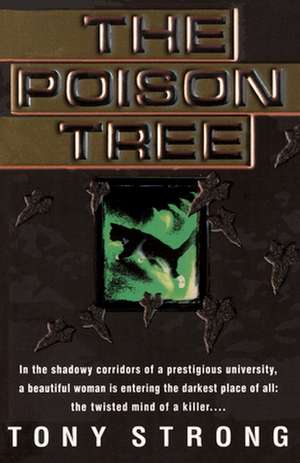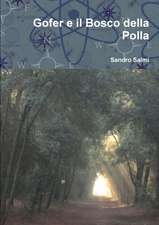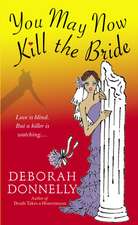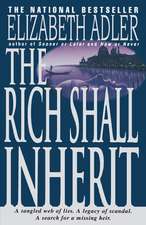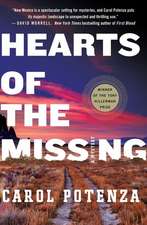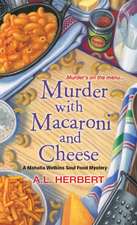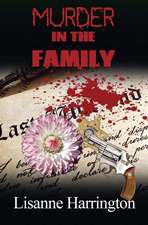The Poison Tree
Autor Tony Strongen Limba Engleză Paperback – 31 aug 1998
A stray cat traumatized by some past act of cruelty, a hidden cache of pornography, a close neighbor's illicit love affair . . . soon Terry is drawn into a mystery more chilling than any in her fictional studies. And back in the classroom she is uncovering a secret, erotic side to academia, where moral rules are suspended and where a tragic obsession may prove deadly for the innocent . . . or for a woman seeing too clearly into a killer's dark and merciless heart.
From the Paperback edition.
Preț: 142.96 lei
Nou
Puncte Express: 214
Preț estimativ în valută:
27.36€ • 29.71$ • 22.98£
27.36€ • 29.71$ • 22.98£
Carte disponibilă
Livrare economică 01-15 aprilie
Preluare comenzi: 021 569.72.76
Specificații
ISBN-13: 9780440614029
ISBN-10: 0440614023
Pagini: 400
Dimensiuni: 140 x 216 x 23 mm
Greutate: 0.59 kg
Editura: Dell Publishing Company
ISBN-10: 0440614023
Pagini: 400
Dimensiuni: 140 x 216 x 23 mm
Greutate: 0.59 kg
Editura: Dell Publishing Company
Notă biografică
Tony Strong lives in England. The Poison Tree is his first novel.
From the Paperback edition.
From the Paperback edition.
Extras
Terry paused on the landing outside her tutor's rooms, partly because they were on the top floor and she needed to get her breath back, and partly because she wanted to listen to the Bach coming from the other side of the door. As an undergraduate she'd once teased Reg that to have a harpsichord in your rooms verged on the pretentious; he'd looked mildly surprised and said, as if it were perfectly obvious, "But I couldn't have got a piano up the stairs." He'd proceeded to play her a rousing pub version of "Knees Up, Mother Brown," though quite frankly on the delicate, tinkling strings of the harpsichord it sounded like Bach anyway. That was Reg: proud of his working-class roots, he was apparently unaware that a lifetime spent in the rarefied climes of academia had left him rather less working class than the average pope. Terry could still remember his mortification at discovering that his students had nicknamed him Regina.
She knocked. The playing stopped, and she heard him call "Come!" just as he had done every week for three years when she'd climbed these stairs for her tutorial.
"My dear Terry."
"Reg."
They embraced. The room even smelled the same, Terry realized, a rich odor redolent of sun-dried leather chairs and sherry. Reg hadn't changed either: a short, hyperactive man in his early fifties, the only difference she could see was that instead of wearing ironed jeans under his formal tutor's gown Reg was now sporting a pair of tracksuit trousers, the better to accommodate a small beer belly.
"Please," he said, indicating one of the leather armchairs. Before he sat in the other he paused and flicked the wings of his gown up in a gesture that, even more than the smell or the harpsichord, brought her student days flooding back. "Tell me everything."
She did. Reg was an excellent listener, the result of a life spent listening to undergraduates read out their essays--it was typical of him that, while quite happy to encourage students like Terry to pursue the wildest and most radical feminist critical theories, abandoning the age-old tradition of reading a weekly essay out loud to your tutor would have been unthinkable. He was also deeply charming. Every year he bedded two or three of his most intelligent and beautiful female students: Terry suspected that one of the reasons he had been so keen to have her back was that she had never succumbed to his oblique but unmistakable advances. He had taken no offense at her refusals, so she had taken none at his propositions. It seemed to her to be an eminently civilized way of going about things, although she knew that many students, and some of his colleagues, considered it to be an unforgivable abuse of his position.
She quickly filled him in on the events leading up to her separation from David. Reg said little. She suspected that he had never thought it would work anyway. Skipping the bit about Mo--not for fear of shocking him; Reg would have loved it, but unfortunately he was a notorious gossip and she wanted this part of her life kept private--she concluded with the purchase of the house on Osney Island, and the visitation of the cat.
He raised his eyebrows. "So it was you who bought the college house? I should have guessed from some of the wilder descriptions that were going around."
"It was cheap. And it's a very nice little house."
"Yes, it was always very popular with the students. Some of them were rather cross it was sold, in fact, given how little housing stock the college can offer. Doubtless it was explained to them that the sale was purely motivated by fears for their safety, and not in the least by the fact that house prices are going to fall over the next few years." He beamed cynically.
"Did you know the dead student, then, Reg?"
"Hugh Scott? Certainly. One of my own second years."
"What was he like?" she asked curiously.
Reg put on a somber face. "A golden boy, absolutely golden. A talented young mind with all his life ahead of him."
"Reg!"
Reg giggled. "Aren't we wicked? Actually, he was one of those rather dreary Hooray Henries who only get in because they've been so well taught. Absolutely beautiful, no soul whatsoever, though I don't think he realized it himself. He wrote appallingly bad poetry from time to time, but it was clear that he was destined for an upper second and a job in a merchant bank. He reminded me of your tedious ex-husband, in fact." Terry tried to look disapproving at this levity, but actually it was a great relief not to have to be serious about it for once. He giggled again.
She said, "The thing is, I ought to go to the police."
"Why on earth do you want to do that?"
She explained about the cannibalistic cat and the burns that might or might not be from a soldering iron.
"Let me give you some advice," he said, serious now. "The university is very intent on keeping a low profile over this one."
"It wasn't the university's fault, though, surely?"
"No, but . . ." Reg looked at her for a moment--almost, she thought, as if he were trying to judge how much to tell her. "We are in loco parentis, after all," he said. "And there could be some silly publicity. He was a member of the Catamites, you know."
"The Catamites?" Terry vaguely remembered a college dining society of that name. Its sole function, so far as she had been aware, was to throw parties, each more lavish and outrageous than the one before. She had a fuzzy memory of attending one herself: the theme had been Fur Coat and No Knickers. A certain amount of cautious debauchery and recreational drug-taking had taken place, to be sure, but nothing particularly excessive by the standards of the time. "What have the Catamites got to do with it?"
"You know what journalists are like. They love a good dining-society story. Privileged youth with more money than sense, that sort of thing. And given the nature of young Scott's demise . . ."
"Just because they're called the Catamites, you think someone might assume there's a connection? Come on, Reg. No one ever thought the Catamites were really raving queers--quite the reverse, if I remember rightly. It's just a way for public schoolboys to Úpater les bourgeois."
"Of course, you must do what you think best," Reg said mildly.
She sighed. "No, I'm going to have to get it over with. I'll go down to the police station this afternoon."
"You must admit," he said thoughtfully, "it's somewhat ironic, your talking to the police about a murder."
"You never really approved of my thesis subject, did you?"
Reg tutted energetically. "You mustn't think that. As it happens, having an expert in your field in the college will be very handy for us when the new Chair's announced."
"A Chair of detective fiction? At Oxford? You're pulling my leg!" The detective novel was a fashionable literary subject just then, undergraduates tending to feel that enough had already been written on the Role of Nature in Wordsworth, but among the older academics it was still considered a genre too frivolous to be worthy of serious critical analysis. Postgraduates who, like Terry, wanted to make detective fiction the subject of their doctorate generally found that their supervisors looked askance.
Reg tutted gently at her. "Where have you been, Terry? I thought out there in the real world people at least read the papers. Oxford's all about market forces these days; hence the proposed Pensung Chair of Detective Fiction, sponsored by Kim Chong. You have heard of Dr. Chong, presumably?"
"Chong--isn't he a Korean?"
Reg nodded. "Electronics millionaire. In fact, to judge by today's three-point stock-market rise, probably a billionaire. He's also a fanatical reader of crime books."
"I had heard of him, actually. But I didn't know he was a doctor."
"By a happy coincidence, Terry, an honorary doctorate was bestowed on Kim Chong just over two years ago by this very college." He beamed. "We grabbed him before the others. Well, Edinburgh had a go but we saw them off easily enough. These events were not unconnected with the fact that Kim Chong, M.A., is a St. Mary's alumnus. You would have overlapped, in fact. He matriculated seven years ago."
Terry searched her memory. There had been one or two Asians around, she seemed to recall, but they hadn't spoken much English and with the arrogance of youth she had simply tuned them out. "And will the new professorship be attached to St. Mary's?" she asked.
"Not necessarily, though of course we'd like it. He's already paid off his debt to us with a rather fine music room. And McGilchrist is trying to get the Chair for Magdalen."
"McGilchrist? I went to his seminars. Is he still a Marxist?"
Reg nodded. "Rabidly so. I hear he offers his undergraduates fizzy lager instead of sherry."
Terry looked hard at him, but it was impossible to be sure whether or not he was joking. "Won't his, um, extremism be a problem with Dr. Chong?"
Reg sighed ostentatiously. "Really, Terry. Don't you know anything about the politics of Korea and their economic relationship with the emerging market economy in China?" Terry shook her head, afraid she might laugh. "Well, I won't go into it now. The point is, St. Mary's needs to be seen to be doing something on detective writers, which is why I'd like you to do some teaching on them. Only the dead ones, of course: we haven't completely abandoned our standards." This was a reference to the fact that at Oxford literature had to have been written before 1960 in order to qualify for inclusion on the syllabus. As far as the university was concerned, death was a necessary accompaniment to greatness. "It's just a few seminars I'm after, though if you can publish something as well, so much the better. I've taken the liberty of asking McGilchrist to prepare a reading list." He handed Terry a sealed envelope. The whole thing was strangely redolent of a spymaster briefing one of his operatives; which, she realized, was probably why Reg was enjoying it so much.
"This is from McGilchrist?" she asked as she took it. "Isn't that rather magnanimous of him?"
"Of course. You're not in commerce anymore, Terry. Here we're all on the same side: the pursuit of knowledge, beauty, and goodness."
What Reg was pursuing was rather more bankable than beauty, Terry reflected, but she kept the thought to herself.
"Speaking of other academics," she said as she stood up to go, "do you know Brian Eden at all?"
"Certainly. There's an example of what I mean when I say the university is changing. An absolutely brilliant mind, still young--there was a time when he'd have had to wait his turn for all the academic honors, but these days someone like that has recognition heaped upon him. He's very telegenic too. The American universities are desperate to have him, but for the moment he seems quite loyal to us."
"I'm going to a party at his house tonight. He lives next door to me, you know."
"It should certainly be entertaining. Though from what I gather," Reg said thoughtfully, "he'll be keeping a rather low profile for a while too."
"Why?" But Reg didn't elaborate.
When he showed her out onto the landing there was an undergraduate waiting to see him, a nervous-looking young man with dark hair and very pale skin. "Have you met Edward, Terry?" Reg asked.
"No, I don't think so." The boy shook her hand shyly and looked at his feet.
"Edward will be joining the second years. You'll be teaching him, so in a sense you'll both be the new boys." For some reason this made the young man blush even more. Terry gave him what she hoped was an encouraging smile and left him with Reg.
* * *
She strolled out of the college, noting the new music rooms Reg had mentioned. By anyone's standards St. Mary's wasn't one of Oxford's more photogenic colleges. Admittedly, there was a fine chapel, once a parish church, around which building styles of various centuries radiated outward, like rings in an oak tree. First came the quadrangle of Victorian staircases in intricately patterned brick where Reg had his rooms. Beyond this, almost fluorescent by comparison, were the red-brick halls of residence which housed the first-year undergraduates, which in turn were surrounded by the glass-and-metal constructions of the last fifteen years. A series of archways and apparently random gaps led from one period to the next, adding to the ramshackle effect. Here and there benefactors had attempted to brighten the place up or commemorate their achievements with brick-built fountains, but the uses found for them by unruly undergraduates had prompted the college authorities to fill them in with earth. Institutional lobelias and scraggy conifers now stood where their designers had imagined flowing cascades and waterspouts. In Terry's day it had been a common sight to see gaggles of American tourists, accustomed to the idea that all Oxford colleges were places of dreaming spires and tranquil gardens, wandering in through the porter's lodge ("Plodge" in the college jargon) with their cameras at the ready, only to lower them in disbelief and beat a hasty retreat.
Terry paused in the lodge to see whether she had been given a pigeonhole yet for her mail. She had, though it was empty. What next? she wondered. There was so much to do: the house, the work for her doctorate, a note in the shop window about the cat, Reg's blasted reading list. Since she was in the vicinity, it seemed sensible to go and renew her membership of the Bodleian library. There was a quaint oath you had to swear, not to kindle flame in the library's precincts: medievalese for No Smoking. But first she'd better get the police thing out of the way. She started walking briskly in the direction of the St. Aldgates police station.
* * *
Detective Inspector Richard Girdler was not best pleased. He had a murder investigation that was going nowhere, he'd cricked his neck playing rugby in the police side the day before, and the desk sergeant had just phoned up to say that there was a woman downstairs who'd walked in off the street and announced that her cat had witnessed the killing. Just what he needed right now: half an hour with some old loony who thought her pet was Sherlock Holmes. He put the phone down wearily and scanned the desks outside his office for a couple of faces to do the interview for him, but unfortunately everyone was out apart from a young female detective constable, working through the pile of fingerprint reports.
"DC Hughes, with me," he said curtly, pulling on his jacket.
"Sir?" Jane Hughes came over eagerly, grateful for anything that might break the monotony.
"Don't get excited, it's just an interview. Room seven. A lady whose cat may have solved the murder. Let's hope she hasn't been abducted by aliens before we get there," he added under his breath.
* * *
Five minutes later Girdler's attitude was rather different. It wasn't just that the woman had turned out to be young and attractive, Jane Hughes admitted to herself; the DI was better than most of her male colleagues at ignoring the skirt factor when he had to. He'd started to fill in the interview sheet, and had asked for her name and address.
"Terry Williams, fift
From the Paperback edition.
She knocked. The playing stopped, and she heard him call "Come!" just as he had done every week for three years when she'd climbed these stairs for her tutorial.
"My dear Terry."
"Reg."
They embraced. The room even smelled the same, Terry realized, a rich odor redolent of sun-dried leather chairs and sherry. Reg hadn't changed either: a short, hyperactive man in his early fifties, the only difference she could see was that instead of wearing ironed jeans under his formal tutor's gown Reg was now sporting a pair of tracksuit trousers, the better to accommodate a small beer belly.
"Please," he said, indicating one of the leather armchairs. Before he sat in the other he paused and flicked the wings of his gown up in a gesture that, even more than the smell or the harpsichord, brought her student days flooding back. "Tell me everything."
She did. Reg was an excellent listener, the result of a life spent listening to undergraduates read out their essays--it was typical of him that, while quite happy to encourage students like Terry to pursue the wildest and most radical feminist critical theories, abandoning the age-old tradition of reading a weekly essay out loud to your tutor would have been unthinkable. He was also deeply charming. Every year he bedded two or three of his most intelligent and beautiful female students: Terry suspected that one of the reasons he had been so keen to have her back was that she had never succumbed to his oblique but unmistakable advances. He had taken no offense at her refusals, so she had taken none at his propositions. It seemed to her to be an eminently civilized way of going about things, although she knew that many students, and some of his colleagues, considered it to be an unforgivable abuse of his position.
She quickly filled him in on the events leading up to her separation from David. Reg said little. She suspected that he had never thought it would work anyway. Skipping the bit about Mo--not for fear of shocking him; Reg would have loved it, but unfortunately he was a notorious gossip and she wanted this part of her life kept private--she concluded with the purchase of the house on Osney Island, and the visitation of the cat.
He raised his eyebrows. "So it was you who bought the college house? I should have guessed from some of the wilder descriptions that were going around."
"It was cheap. And it's a very nice little house."
"Yes, it was always very popular with the students. Some of them were rather cross it was sold, in fact, given how little housing stock the college can offer. Doubtless it was explained to them that the sale was purely motivated by fears for their safety, and not in the least by the fact that house prices are going to fall over the next few years." He beamed cynically.
"Did you know the dead student, then, Reg?"
"Hugh Scott? Certainly. One of my own second years."
"What was he like?" she asked curiously.
Reg put on a somber face. "A golden boy, absolutely golden. A talented young mind with all his life ahead of him."
"Reg!"
Reg giggled. "Aren't we wicked? Actually, he was one of those rather dreary Hooray Henries who only get in because they've been so well taught. Absolutely beautiful, no soul whatsoever, though I don't think he realized it himself. He wrote appallingly bad poetry from time to time, but it was clear that he was destined for an upper second and a job in a merchant bank. He reminded me of your tedious ex-husband, in fact." Terry tried to look disapproving at this levity, but actually it was a great relief not to have to be serious about it for once. He giggled again.
She said, "The thing is, I ought to go to the police."
"Why on earth do you want to do that?"
She explained about the cannibalistic cat and the burns that might or might not be from a soldering iron.
"Let me give you some advice," he said, serious now. "The university is very intent on keeping a low profile over this one."
"It wasn't the university's fault, though, surely?"
"No, but . . ." Reg looked at her for a moment--almost, she thought, as if he were trying to judge how much to tell her. "We are in loco parentis, after all," he said. "And there could be some silly publicity. He was a member of the Catamites, you know."
"The Catamites?" Terry vaguely remembered a college dining society of that name. Its sole function, so far as she had been aware, was to throw parties, each more lavish and outrageous than the one before. She had a fuzzy memory of attending one herself: the theme had been Fur Coat and No Knickers. A certain amount of cautious debauchery and recreational drug-taking had taken place, to be sure, but nothing particularly excessive by the standards of the time. "What have the Catamites got to do with it?"
"You know what journalists are like. They love a good dining-society story. Privileged youth with more money than sense, that sort of thing. And given the nature of young Scott's demise . . ."
"Just because they're called the Catamites, you think someone might assume there's a connection? Come on, Reg. No one ever thought the Catamites were really raving queers--quite the reverse, if I remember rightly. It's just a way for public schoolboys to Úpater les bourgeois."
"Of course, you must do what you think best," Reg said mildly.
She sighed. "No, I'm going to have to get it over with. I'll go down to the police station this afternoon."
"You must admit," he said thoughtfully, "it's somewhat ironic, your talking to the police about a murder."
"You never really approved of my thesis subject, did you?"
Reg tutted energetically. "You mustn't think that. As it happens, having an expert in your field in the college will be very handy for us when the new Chair's announced."
"A Chair of detective fiction? At Oxford? You're pulling my leg!" The detective novel was a fashionable literary subject just then, undergraduates tending to feel that enough had already been written on the Role of Nature in Wordsworth, but among the older academics it was still considered a genre too frivolous to be worthy of serious critical analysis. Postgraduates who, like Terry, wanted to make detective fiction the subject of their doctorate generally found that their supervisors looked askance.
Reg tutted gently at her. "Where have you been, Terry? I thought out there in the real world people at least read the papers. Oxford's all about market forces these days; hence the proposed Pensung Chair of Detective Fiction, sponsored by Kim Chong. You have heard of Dr. Chong, presumably?"
"Chong--isn't he a Korean?"
Reg nodded. "Electronics millionaire. In fact, to judge by today's three-point stock-market rise, probably a billionaire. He's also a fanatical reader of crime books."
"I had heard of him, actually. But I didn't know he was a doctor."
"By a happy coincidence, Terry, an honorary doctorate was bestowed on Kim Chong just over two years ago by this very college." He beamed. "We grabbed him before the others. Well, Edinburgh had a go but we saw them off easily enough. These events were not unconnected with the fact that Kim Chong, M.A., is a St. Mary's alumnus. You would have overlapped, in fact. He matriculated seven years ago."
Terry searched her memory. There had been one or two Asians around, she seemed to recall, but they hadn't spoken much English and with the arrogance of youth she had simply tuned them out. "And will the new professorship be attached to St. Mary's?" she asked.
"Not necessarily, though of course we'd like it. He's already paid off his debt to us with a rather fine music room. And McGilchrist is trying to get the Chair for Magdalen."
"McGilchrist? I went to his seminars. Is he still a Marxist?"
Reg nodded. "Rabidly so. I hear he offers his undergraduates fizzy lager instead of sherry."
Terry looked hard at him, but it was impossible to be sure whether or not he was joking. "Won't his, um, extremism be a problem with Dr. Chong?"
Reg sighed ostentatiously. "Really, Terry. Don't you know anything about the politics of Korea and their economic relationship with the emerging market economy in China?" Terry shook her head, afraid she might laugh. "Well, I won't go into it now. The point is, St. Mary's needs to be seen to be doing something on detective writers, which is why I'd like you to do some teaching on them. Only the dead ones, of course: we haven't completely abandoned our standards." This was a reference to the fact that at Oxford literature had to have been written before 1960 in order to qualify for inclusion on the syllabus. As far as the university was concerned, death was a necessary accompaniment to greatness. "It's just a few seminars I'm after, though if you can publish something as well, so much the better. I've taken the liberty of asking McGilchrist to prepare a reading list." He handed Terry a sealed envelope. The whole thing was strangely redolent of a spymaster briefing one of his operatives; which, she realized, was probably why Reg was enjoying it so much.
"This is from McGilchrist?" she asked as she took it. "Isn't that rather magnanimous of him?"
"Of course. You're not in commerce anymore, Terry. Here we're all on the same side: the pursuit of knowledge, beauty, and goodness."
What Reg was pursuing was rather more bankable than beauty, Terry reflected, but she kept the thought to herself.
"Speaking of other academics," she said as she stood up to go, "do you know Brian Eden at all?"
"Certainly. There's an example of what I mean when I say the university is changing. An absolutely brilliant mind, still young--there was a time when he'd have had to wait his turn for all the academic honors, but these days someone like that has recognition heaped upon him. He's very telegenic too. The American universities are desperate to have him, but for the moment he seems quite loyal to us."
"I'm going to a party at his house tonight. He lives next door to me, you know."
"It should certainly be entertaining. Though from what I gather," Reg said thoughtfully, "he'll be keeping a rather low profile for a while too."
"Why?" But Reg didn't elaborate.
When he showed her out onto the landing there was an undergraduate waiting to see him, a nervous-looking young man with dark hair and very pale skin. "Have you met Edward, Terry?" Reg asked.
"No, I don't think so." The boy shook her hand shyly and looked at his feet.
"Edward will be joining the second years. You'll be teaching him, so in a sense you'll both be the new boys." For some reason this made the young man blush even more. Terry gave him what she hoped was an encouraging smile and left him with Reg.
* * *
She strolled out of the college, noting the new music rooms Reg had mentioned. By anyone's standards St. Mary's wasn't one of Oxford's more photogenic colleges. Admittedly, there was a fine chapel, once a parish church, around which building styles of various centuries radiated outward, like rings in an oak tree. First came the quadrangle of Victorian staircases in intricately patterned brick where Reg had his rooms. Beyond this, almost fluorescent by comparison, were the red-brick halls of residence which housed the first-year undergraduates, which in turn were surrounded by the glass-and-metal constructions of the last fifteen years. A series of archways and apparently random gaps led from one period to the next, adding to the ramshackle effect. Here and there benefactors had attempted to brighten the place up or commemorate their achievements with brick-built fountains, but the uses found for them by unruly undergraduates had prompted the college authorities to fill them in with earth. Institutional lobelias and scraggy conifers now stood where their designers had imagined flowing cascades and waterspouts. In Terry's day it had been a common sight to see gaggles of American tourists, accustomed to the idea that all Oxford colleges were places of dreaming spires and tranquil gardens, wandering in through the porter's lodge ("Plodge" in the college jargon) with their cameras at the ready, only to lower them in disbelief and beat a hasty retreat.
Terry paused in the lodge to see whether she had been given a pigeonhole yet for her mail. She had, though it was empty. What next? she wondered. There was so much to do: the house, the work for her doctorate, a note in the shop window about the cat, Reg's blasted reading list. Since she was in the vicinity, it seemed sensible to go and renew her membership of the Bodleian library. There was a quaint oath you had to swear, not to kindle flame in the library's precincts: medievalese for No Smoking. But first she'd better get the police thing out of the way. She started walking briskly in the direction of the St. Aldgates police station.
* * *
Detective Inspector Richard Girdler was not best pleased. He had a murder investigation that was going nowhere, he'd cricked his neck playing rugby in the police side the day before, and the desk sergeant had just phoned up to say that there was a woman downstairs who'd walked in off the street and announced that her cat had witnessed the killing. Just what he needed right now: half an hour with some old loony who thought her pet was Sherlock Holmes. He put the phone down wearily and scanned the desks outside his office for a couple of faces to do the interview for him, but unfortunately everyone was out apart from a young female detective constable, working through the pile of fingerprint reports.
"DC Hughes, with me," he said curtly, pulling on his jacket.
"Sir?" Jane Hughes came over eagerly, grateful for anything that might break the monotony.
"Don't get excited, it's just an interview. Room seven. A lady whose cat may have solved the murder. Let's hope she hasn't been abducted by aliens before we get there," he added under his breath.
* * *
Five minutes later Girdler's attitude was rather different. It wasn't just that the woman had turned out to be young and attractive, Jane Hughes admitted to herself; the DI was better than most of her male colleagues at ignoring the skirt factor when he had to. He'd started to fill in the interview sheet, and had asked for her name and address.
"Terry Williams, fift
From the Paperback edition.
Recenzii
In the shadowy corridors of a prestigious university, a beautiful woman is entering the darkest place of all: the twisted mind of a killer....
"Strong works out his whodunit plot with care and shows no mercy in exposing the loose morals of Oxford's hedonistic literary crowd."
--The New York Times Book Review
"The classic English mystery meets the modern American thriller...and the result is bloody screaming murder."
--Matthew Hall, author of The Art of Breaking Glass
From the Paperback edition.
"Strong works out his whodunit plot with care and shows no mercy in exposing the loose morals of Oxford's hedonistic literary crowd."
--The New York Times Book Review
"The classic English mystery meets the modern American thriller...and the result is bloody screaming murder."
--Matthew Hall, author of The Art of Breaking Glass
From the Paperback edition.
